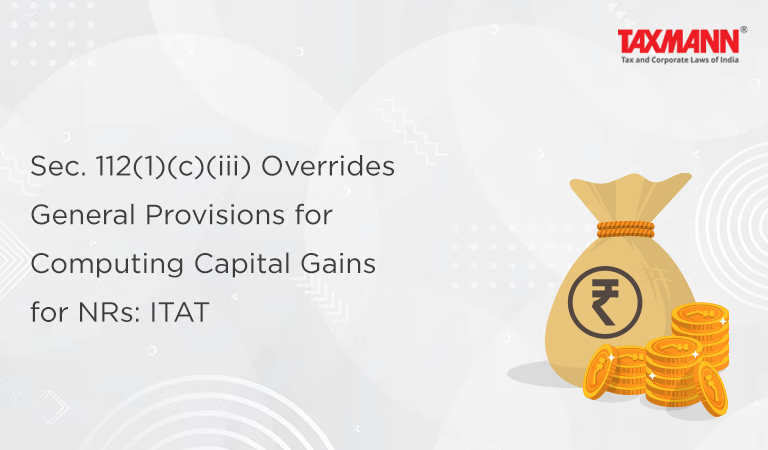Sec. 112(1)(c)(iii) Overrides General Provisions for Computing Capital Gains for NRs: ITAT
- Blog|News|Income Tax|
- 3 Min Read
- By Taxmann
- |
- Last Updated on 28 April, 2023

Case Details: Legatum Ventures Ltd. v. ACIT - [2023] 149 taxmann.com 436 (Mumbai-Trib.)
Judiciary and Counsel Details
-
- G.S. Pannu, President & Sandeep Singh Karhail, Judicial Member
- Madhur Agarwal for the Appellant.
- Amit Kumar Soni for the Respondent.
Facts of the Case
Assessee-company was incorporated in United Arab Emirates (UAE) and was mainly involved in investment activities. During the scrutiny, Assessing Officer (AO) observed that the assessee sold shares of an Indian Private Limited and declared a long-term capital loss of around Rs. 3 Crores after applying 1st proviso to section 48 (i.e., reconversion of the Indian rupee into the same foreign currency).
The Assessing Officer (AO) held that the provision of section 112(1)(c)(iii) applies exclusively to the non-residents, and thus, he computed the capital gains by applying section 112(1)(c)(iii). It resulted in long-term capital gains of more than Rs. 17 crores.
Aggrieved-assessee filed objections before the Dispute Resolution Panel (DRP). DRP confirmed the additions made by AO. Aggrieved by the order, the assessee filed an instant appeal to the Mumbai Tribunal.
ITAT Held
The Tribunal held that section 112(1)(c)(iii) deals with tax on long-term capital gains. In the case of a non-resident, the income tax on long-term capital gains arising from the transfer of unlisted shares of a company not being a company in which the public are substantially interested shall be calculated at the rate of 10% on the capital gains. The section also provides that capital gains shall be computed without giving effect to the 1st and 2nd proviso to section 48.
Assessee contended that section 112 only provides the rate of tax, which is a step subsequent to the determination of total income and for the computation of income chargeable under the head “capital gains”. Since assessee was non-resident and earned capital gains from transfer of unlisted shares, therefore the benefit of 1st proviso to section 48 is available as said section provides the mode of computation of capital gains.
Tribunal held that section 112(1)(c)(iii) is a special provision for computation of capital gains, in case of a non-resident, arising from the transfer of unlisted shares and securities. While on the other hand, section 48 is a general provision which deals with the mode of computation of capital gains in all the cases of transfer of capital assets.
Since section 112(1)(c)(iii) is the specific provision, therefore, if ingredients of the said section are fulfilled, capital gains are required to be computed as per the manner provided under the said section.
It is a well-settled rule of interpretation that if a special provision is made respecting a certain matter, that matter is excluded from the general provision under the rule which is expressed by the maxim “Generallia specialibus non derogant”. Further, it is also a well-settled rule of construction that when, in an enactment, two provisions exist, which cannot be reconciled with each other, they should be so interpreted that, if possible, the effect should be given to both.
Therefore, if the submission of the assessee that the income chargeable under the head “capital gains” is to be computed only as per section 48 is accepted, then the same would render the computation mechanism provided in section 112(1)(c)(iii) completely otiose and redundant.
Thus, there was no infirmity in the orders passed by the lower authorities taxing the long-term capital gains as per section 112(1)(c)(iii).
Disclaimer: The content/information published on the website is only for general information of the user and shall not be construed as legal advice. While the Taxmann has exercised reasonable efforts to ensure the veracity of information/content published, Taxmann shall be under no liability in any manner whatsoever for incorrect information, if any.

Taxmann Publications has a dedicated in-house Research & Editorial Team. This team consists of a team of Chartered Accountants, Company Secretaries, and Lawyers. This team works under the guidance and supervision of editor-in-chief Mr Rakesh Bhargava.
The Research and Editorial Team is responsible for developing reliable and accurate content for the readers. The team follows the six-sigma approach to achieve the benchmark of zero error in its publications and research platforms. The team ensures that the following publication guidelines are thoroughly followed while developing the content:
- The statutory material is obtained only from the authorized and reliable sources
- All the latest developments in the judicial and legislative fields are covered
- Prepare the analytical write-ups on current, controversial, and important issues to help the readers to understand the concept and its implications
- Every content published by Taxmann is complete, accurate and lucid
- All evidence-based statements are supported with proper reference to Section, Circular No., Notification No. or citations
- The golden rules of grammar, style and consistency are thoroughly followed
- Font and size that’s easy to read and remain consistent across all imprint and digital publications are applied



 CA | CS | CMA
CA | CS | CMA
